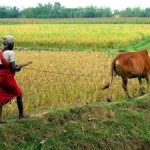The paper include a number of recommendations, including –
- Developing a common global standard for measuring and reporting food loss and waste by governments and the private sector;
- Setting global, national, and corporate food loss and waste reduction targets on the order of 50 percent;
- Doubling investment in reducing post-harvest losses in developing countries; and
- Establishing agencies and organizations in developed countries tasked with reducing food waste.
In addition, UNEP is currently developing a new food waste prevention and reduction tool kit, together with experts, supermarkets, governments and other partners. The initiative will support governments, companies and cities to better assess their own levels of food waste, pin-point areas in their businesses and communities where food is being needlessly wasted, and devise strategies to reduce this waste. The tool kit is expected to be available for wide-spread deployment before the end of 2013, and aims to underpin a transition to a less wasteful world.
World Environment Day
From the traditional knowledge of indigenous communities in remote rural areas, to major conferences in the fast-expanding capital Ulaanbaatar, issues around food security and sustainability are featuring high on the agenda for World Environment Day (June 5) in global host country Mongolia.
Events with the country’s ancient herding communities highlighted age-old techniques that have been used for centuries to preserve food and avoid waste.
In the past, Mongolia’s traditional horsemen frequently relied on ‘borts’ to sustain them over long journeys. The foodstuff consists of concentrated beef equal to the protein of an entire cow condensed and ground down to the size of a plate. This method of food preservation could produce a meal equivalent to several steaks when the protein was shaved into hot water to make soup.
In the run-up to World Environment Day, internet users have been submitting a host of traditional food-saving ideas and traditions via UNEP’s Facebook page. These include chuño from South America, which involves exposing potatoes to the freezing night air and hot daytime sun for five days, before trampling them to squeeze out any moisture. Chuño can last for several months, or even years.
Beyond Mongolia, thousands of people across the world are taking part in World Environment Day activities to highlight the need to consume and produce food more sustainably.
In Bosnia and Herzegovina, the capital city Sarajevo will host environmental experts in a series of events focused on engaging citizens on food waste and its environmental impact.
In China, Shanghai’s International Student Conference on Environment and Sustainability (ISCES) will see hundreds of students debate and discuss the theme of ‘Food, Health and Sustainable Development’.
UNEP’s Geneva-based Regional Office for Europe is running a competition called ‘Love Your Leftovers’, where people can submit a recipe that they use to clean out the fridge. The competition will be judged by a top chef at the famous Cafe de la Paix in central Paris.
The new working paper, ‘Reducing Food Loss and Waste’, is available at:
http://www.wri.org/publication/reducing-food-loss-and-waste
Source: UNEP.
 About World Environment Day (WED)
About World Environment Day (WED)
World Environment Day (WED) aims to be the biggest and most widely celebrated global day for positive environmental action. WED activities take place year round but climax on June 5. WED celebrations began in 1972 and have grown to become the one of the main vehicles through which the UN stimulates world-wide awareness of the environment and encourages political attention and action. The WED 2013 theme is in support on the ‘Think.Eat.Save’ campaign. For more information on activities in the host country Mongolia, and on hundreds of other global events, visit www.unep.org/wed/.
About the Think.Eat.Save. Reduce Your Foodprint Campaign
The campaign harnesses the expertise of organizations such as WRAP (Waste and Resources Action Programme), Feeding the 5,000 and other partners, including national governments, who have considerable experience targeting and changing wasteful practices. It aims to accelerate action and provide a global vision and information-sharing portal for the many initiatives currently underway around the world that aim to reduce food waste and food loss. For more information, visit www.thinkeatsave.org.














